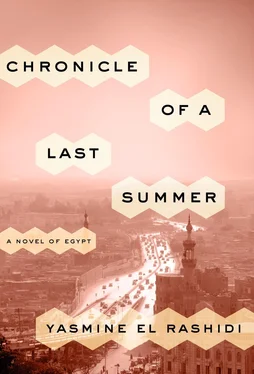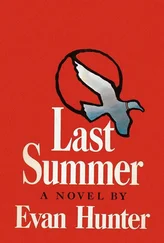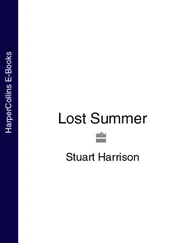The last morning with Uncle, Mama had walked into the living room and stared at the newspapers. At the bottom of the front page was a picture of Toshka, the president’s New Valley Project, intended to turn thousands of acres of desert into agricultural land. Uncle called it the greatest failed promise of any president. Nasser’s project had been the Aswan High Dam. Sadat’s the Suez Canal. Mubarak’s was Toshka. Every day Al-Ahram ran stories about the promise of Toshka. It had been ten years. Mama had looked at the picture, the desert landscape with strata of color, and let her eyes drift, then asked Uncle, seemingly out of nowhere, about the paintings downstairs. He tilted his head sideways and asked if she remembered the day they sat on the balcony eating mangoes until they both got sick? It was the day after Granny had painted the eighteenth miniature in the series. She had propped it up against the ledge of the balcony. It had always been his favorite, because it was like the horizon, the beginning of a palette shift. I made a mental note to look at that painting later. Maybe it could even be the cover of my book . Then I pushed myself up from the sofa and stood over Uncle and Mama. I have to go. Where? Dar Merit. Why? I’m editing a manuscript for a forthcoming book. The first-ever translation of Khairallah Ali. A novel? A story of listlessness, and falling in love on the coast. A love story that is understood later, long after its moments of conception. Mama slowly nodded her head. Uncle told me he was still waiting for my book. I smiled, told him I was working on it, leaned over, kissed him on one cheek, taking steps backwards and giving Mama a half wave with my lowered hand. She told me to be careful. Uncle told her to let me be and kept talking. I heard him tell Mama that my writing would free me, and then after some murmuring I couldn’t make out, he repeated the word catastrophe, ma’saa, as I went down the steps. He may have been speaking about Toshka, or even the Copts. It never occurred to me that he might have been referring to me. I had no sense it would be our final goodbye. Later I wondered if Mama might have known, if that’s why she had asked about the paintings. She had premonitions about things.
I walked around the house that day and saw a neighbor from afar. She was one of the ones who lived with her shutters closed. I hadn’t seen her in months. She looked shrunken and sallow. Her daughter, an only child, had fallen out of the window of her fifth-floor bedroom eight months earlier. The parking attendant had found her at dawn. She was Dido’s age. He had known her through a friend. When Mama had called to offer condolences, they told her it was a sugar coma. Diabetes. She had been sitting at the window and fell out. Dido said it was more than that. She had been depressed for years. I watched the mother, hunched over the walking stick she now used, Mama’s age but looking eighty. I avoided her, my eyes down, tracing the potholed street. At the corner, the bawab of the next-door building was watching TV. It was set up on the pavement, and he sat on a small wooden stool. I traced his wire, up to a balcony on the first floor. He heard me pass, raised his head, nodded, smiled. I could hear the laughter of Ismail Yaseen from his set, then Sabah’s voice break into song. I raised my arm, trying to stop a taxi. The black-and-white cars slowed as they approached. Downtown , I called. Most of them sped off as quickly as they had slowed beside me, sometimes shaking their heads in apology, other times as if to say, Are you crazy? Downtown was impossible to move through by car. There were barricades everywhere, around all the government buildings, streets had been blocked, traffic rerouted. There was no explanation as to why. It happened overnight. People said it was out of fear, but fear of what, we didn’t know. On one street they said it was because the president’s son had bought property there. They hadn’t closed the street but rather redirected traffic to go from north to south, instead of the other way. There was no logic as to why. One taxi driver tells me I’m better off walking. I wait fifteen more minutes as each taxi slows and zooms off. One hesitates, asks how much I will pay, hesitates some more, then declines apologetically. Nobody walks, but that day I did. I walked down the corniche, along the Nile, under sagging trees, over broken pavements, piles of garbage, past the cultural center that had been started in an abscess of space under the bridge. I walked all the way down the fenced-off Nile. I could see none of the river except at the rowing club where a metal gate was flung open. Hedges had overgrown and turned ashen and been littered and then covered with corrugated metal. Walls had been made higher. There was no sense, anymore, of being surrounded by waters. It was another reminder of the battle over the Nile’s waters. Before he died, Uncle had said that he hoped Ethiopia would submit. He would turn his head up and say it as if making a wish, throwing it out into the sky to be heard or maybe caught in the wind and blown to open ears. Uncle said our future, possibility, was all in the Nile waters. The dam could never be built. It would be colonialism all over again.
—
It has been almost four years since Uncle died. Forty-one months since the revolution. Like all my friends I find it hard to sleep through the night. My sleep is fitful. I get up, pace, check the news, Twitter. I try to work. My desk faces a wall. A sketch of Mama’s, a portrait, hangs above it. Piles surround me. Newspapers, books. On the floor, leaning against walls, opened randomly, left on the sofa. What I thought was a script is slowly turning into a book. It’s an hour past dawn, but the heat is already scorching. My shutters are partially down, blocking out the sun. A plastic fan whines in the corner. In the background I can hear the chatter of birds. I pick up Mahmoud Darwish’s Memory for Forgetfulness , Booklet No. 48, fiction, Nawal El Saadawi writing for the art biennial Documenta. I browse, leaf through pages, book after book, mindlessly, searching. I flip through a photocopy of an Arabic study on the literature of defeat, what was conceived in the aftermath of ’67. It is described by one writer cited as a new language that spoke to the times. Everything was stripped down to fundamentals, bare, deflated. I read about this new language, one I have read through its novels for years. The more ornate social realism of such prominent writers as Naguib Mahfouz and the virtuous eloquence of Arabic literature were abandoned for more experimental, fragmented works that expressed the anxieties and crises at hand. I pick up another book. Another. Everything has resonance. I wonder about structure, and form. Genre. Can literature, the novel, be written in the form of a script? At what point would it become that, a script ? I think about this as I relive summers and try to write, grapple with the beginnings of a manuscript. The summer before Uncle died. The things that were said. The summer before things changed. Dido and I becoming estranged.
We fought sitting at a café on a pedestrian street in El Borsa downtown. Dido was smoking apple-flavored shisha , I was drinking mint tea served extra sweet. Over the years our views had differed and veered apart. Dido believed fervently that anarchy was better than the despotism we had. My reservations were inherited. He had hoped I might turn out as political as he was, but I’d failed him in every way. He consumed literature voraciously, but thought writing in a country like ours to be an exercise in passivity, a luxurious musing, not a tool for change. He spoke of the need for an urgency to one’s actions, a physicality. I insisted that writing is an action, becomes a physicality. We debated this often, argued about it, sometimes even wrote impassioned letters that we would read to each other out loud. When we fought, though, it was about the two young men who sauntered off the street and sat at a table down from ours. They held hands and wore tight T-shirts. One of them had a yellow headband through his hair. We sat in silence for a long time, Dido inhaling his pipe, watching them from an angle, his head slightly revealing of his scrutiny. I watched with no attempt to conceal my gaze. People walked by. Young men sat down. Two girls with wild curls. Four young boys, also in tight T-shirts, also holding hands. They put two tables together and asked for the unused chairs from nearby. Dido and I looked on. I could hear him inhale. As he exhaled, blowing a single smoke ring into the air, I watched him raise two fingers languidly, gesturing with them and as well with his eyes. His charcoal was out. He wanted a refill. We looked past the white robes of the man placing more cubes of lit charcoal into the mouth of the shisha . Past the growing crowd around us, and to the table with the two young men. A man in a gray safari shirt and faded black trousers had walked towards them. He had been standing at the corner for close to an hour. I had noticed his shoes. Dido had too. They were familiar shoes. Shoes we saw a lot. Shoes of the undercover police. They were pointed, with a ledge. With his head the man gestured to the extra plastic chair at the table. Could he join? The young men hovered forward from their waists, their feet verging on pushing themselves up from the ground. Their gesture: of course . He pulled back the chair and sat. The server rushing forward, saluting him, bowing. The young men in their tight T-shirts, touching hands, leaned forward. Words were exchanged. Dido flicked his head, so fiercely that the tube of his shisha leaped from his hand onto the floor. He swore under his breath. Minutes passed. The man and his shoes got up and walked away. The young men resumed their laughter. Dido fumed. I could see it in his nostrils, in the movement of his chest. He tapped his foot nervously. His thigh trembled. We shared a friend who had fled the country years before. He had been on the moored Queen Boat — turned-nightclub when it was raided by plainclothes state security agents. Someone had noticed them walking on board and alerted those inside. They had revealed themselves by their shoes. More than one hundred men were arrested. Our friend had slipped out. He now lives in Seattle, a political asylee. Those who stayed, some of them, were roped into the state’s network of informers, like the Islamists and dealers. Snitchers, someone had called them in the months after as the trial progressed and we sat at cafés like this one, hesitantly, talking about their fate. Survivors, another had said.
Читать дальше

![Маргарет Миллар - Rose's Last Summer [= The Lively Corpse]](/books/384369/margaret-millar-rose-s-last-summer-the-lively-c-thumb.webp)










